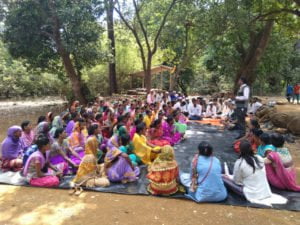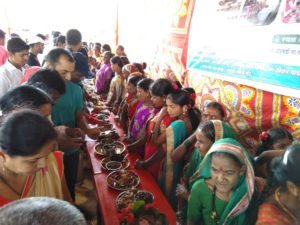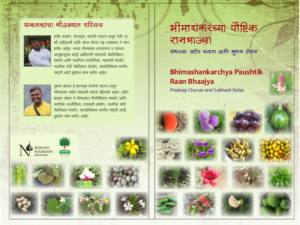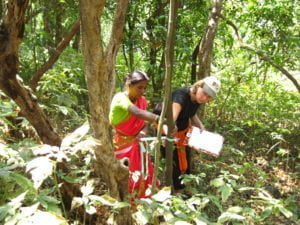Bhimashankar Wildlife Sanctuary, named after Bhimashankar temple was notified by the state government of Maharashtra in 1985, under the Wildlife Protection Act 1972. The sanctuary is situated on the crest of Western Ghats that is recognised as one of the 12-biodiversity hotspots of the world. The sanctuary harbours a large diversity of endemic & specialised flora and fauna such as a sub species of the Indian Giant squirrel and various species of mosses and epiphytes including bioluminescent fungi. The sanctuary is critical for providing livelihood support to several hundred tribal communities who reside within and in the surrounds of the sanctuary. The sanctuary forests also house fourteen sacred groves, protected by the people.
Vision
Based on three decades of ground experience, Kalpavriksh believes that effective management of a PA is possible only if local people are allies and take part in the governance and management of the PA. It is now well established that conservation is not possible in small islands but can be best achieved through incorporating principles of conservation in large landscapes. The experience in last few decades with existing conservation policies has also revealed that the socio-economic, cultural and demographic reality in India will make it impossible to practice exclusionary models of conservation. The country needs to seriously explore consideration models that incorporate a mosaic of governance and management strategies over a large landscape. This will be successful only if the government also considers a moderate macro-economic policy which gives conservation a priority. Some of the most important principles which will make a process like this successful include, mutual trust and respect among all concerned rights-holders and stakeholders. Such mutual trust and respect can be generated only through regular and transparent dialogue, outcomes of which are adhered to by all concerned.
With the above vision, our activities in villages in and around Bhimashankar wildlife sanctuary were initiated in 2007. The overall goal was to help facilitate inclusive conservation governance and management in these villages by supporting local people’s rights over and responsibilities towards surrounding forests and biodiversity.
Strengthening Local and Forest Governance
Community mobilization
Women and youth groups
Capacity building workshops and legal training
Facilitating CFR claims process
Facilitating democratic decision making systems
People and Forest Department interactions
Strengthening Conservation Knowledge, Culture and Practices
Joint ecological studies
Bio-cultural diversity
Local seeds conservation
Natural farming systems
Honey bee conservation and research
Traditional knowledge
Strengthening Economically and Ecologically Sound Livelihoods
Community based eco-tourism
Catering services
Women’s honey enterprise
Facilitating government livelihoods programmes
STRENGTHENING LOCAL GOVERNANCE & MANAGEMENT SYSTEMS
Community mobilization through village based regular meetings and learning discussions - Initiating regular village level discussions, dialogues, and collectivization process, including participation in official gram sabhas, supporting local leadership emerging through these discussions
Women and youth groups – Supporting and helping strengthen existing Women's Self-Help Groups through discussions and learning workshops during monthly meetings; organizing women gram sabhas, women’s maha sabhas, livelihoods based training programmes. Mobilising youth to actively participate in village as well as forest governance.
Capacity building workshops and legal training – Workshops on laws and policies e.g Wildlife Protection Act, Eco-sensitive Zones, Right to Information Act, Biodiversity Act, Joint Forest Management and Eco village development Programmes, Forest Rights Act, National Rural Employment Guarantee Act (NREGA); Workshops on women’s empowerment and role in society; workshops with honey collectors on revisiting and revising traditional and non violent systems of honey collection; training programmes for women on honey processing and sale; among others.
Facilitating democratic decisions making systems - Facilitating the process for democratic decision making systems for village and forest governance
People and Forest Department interactions - Facilitating mutually beneficial interactions between the forest department and the local people; addressing conflicts and strengthening local people’s negotiation power to arrive at the best possible mechanism for effective conservation.
Community Forest Resource Rights (CFR) under the Forest Rights Act – Facilitating claims process under the Forest Rights Act, ensuring these are part of official gram sabha agenda, training programmes on CFRs for gram sabhas and women’s SHG, facilitating internal and informal village discussions on CFRs, people to people learning through community exchanges to other sites, boundary mapping, helping facilitate discussions on rules and regulations, organizing training programmes on filing of claims for local volunteers, among others.
STRENGTHENING CONSERVATION KNOWLEDGE, CULTURE AND PRACTICES
Conducting joint ecological studies with local people, experts and ecological researchers
Celebrating and reviving bio-cultural diversity - through uncultivated and wild food festivals to reconnect the link between community and biodiversity health; van bhojan to celebrate the spirit of the forest; reviving local biodiversity based cultural activities and festivals and facilitating informal and formal village discussions on these subjects.
Local seeds conservation and natural farming systems - Emphasising the need for conservation of local seed diversity and farming systems, looking into their gradual decline, reasons for the decline and need for revival; facilitating community seed exchange processes
Honey bee conservation and research - A participatory study on honey production, bee habitat, declining bee population and reasons for the same. Training workshops on bees and their habitat conservation, traditional systems of honey harvesting and revival of traditional, non-destructive systems of honey harvesting. Organising honey bee festival.
Joint -Documentation of traditional knowledge – Helping local teams (including women’s groups) document local fauna and flora and knowledge related to those, traditional natural resource management strategies and ecologically sensitive cultural practices, traditional seed varieties and farming systems, uncultivated and wild foods, among others.
Bhimashankarchya Paushtik Raan Bhaajya | भीमाशं करच्या पौष्टिक रानभाज्या
Pradeep Chavan and Subhash Dolas have published a booklet on the nutritious wild vegetables of Bhimashankar. To access the soft copy please click HERE. Hard copies of the booklet are now available for free of charge at our office. In case of delivery, postage/courier charges will be applicable.
Strengthening local food systems through kitchen gardening in Bhimashankar Wildlife Sanctuary - An exploratory study on women’s knowledge and knowledge sharing practices by María Villalpando Páez in collaboration with Kalpavriksh. Please click here to read the entire REPORT and ARTICLE.
STRENGTHENING ECONOMICALLY AND ECOLOGICALLY SOUND LIVELIHOODS
Community based Eco-tourism - Community run and managed eco-tourism programme in Yelavali village
Catering services - Women Self-Help Groups catering for tourists in Bhorgiri
Women’s Honey Enterprise - Women Self-Help Groups buying honey from local honey collectors, processing and marketing honey under the brand name “Bhimashankar Honey
Government livelihoods programmes - Facilitating implementation of National Rural Employment Guarantee Act (NREGA); Helping with village Joint Forest Management and Eco-Village-development Programmes (where villagers so desired)




